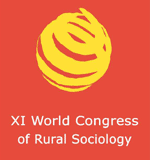| |
 XI World Congress XI World Congress
of Rural Sociology
Trondheim, Norway
July 25-30, 2004
The Congress is over.
Information provided here is for reference.
Programme Theme
Globalisation, Risks and Resistance |
|
| |
Rural areas throughout the world are unevenly affected by the globalisation of production. Governance and regulation, at various levels from global to local, have wrestled with these changes, often pursuing a neo-liberal agenda of deregulation, privatisation, fiscal cutbacks, and minimal welfare justified by the belief that individual self-gain is in the broader interest. This is reflected not only in the institutions of governance but also in property and other rights. Others have related these changes to notions of the 'risk society', detraditionalisation and individualisation, through which social exclusion is "collectively individualised". Social actors, however, find many ways of resisting and negotiating these forces, and in other ways asserting their agency.
The overarching theme of the XI World Congress of Rural Sociology will be to explore unevenness, risks, resistance and dialogue in relation to rural economies and societies throughout the world. And in exploring the role of agency in mediating and negotiating change, congress papers will pay particular attention to the associated processes of social inclusion and exclusion for people in rural areas.
Amongst the sub-themes which might be pursued under this umbrella are the following: - Food supply chains: flexible specialisation, globalisation, regulation, local strategies.
- Risk, trust and ethics in producer-consumer relations.
- Social exclusion and inclusion; markets, state and civil society.
- Gender challenges in changing ruralities.
- Social movements as means of resisting globalisation and neo-liberalism.
- Endogenous rural development initiatives in relation to globalisation.
- Democratisation and participation: who thinks global but acts local?
- Sustainability, health and nutrition in the face of global capital accumulation.
- Resources, Territory and Environment: who is going to control and decide.
- The Family Farm, its resistance and survival.
- Alternative agricultures in the global economy.
|
|

 XI World Congress
XI World Congress